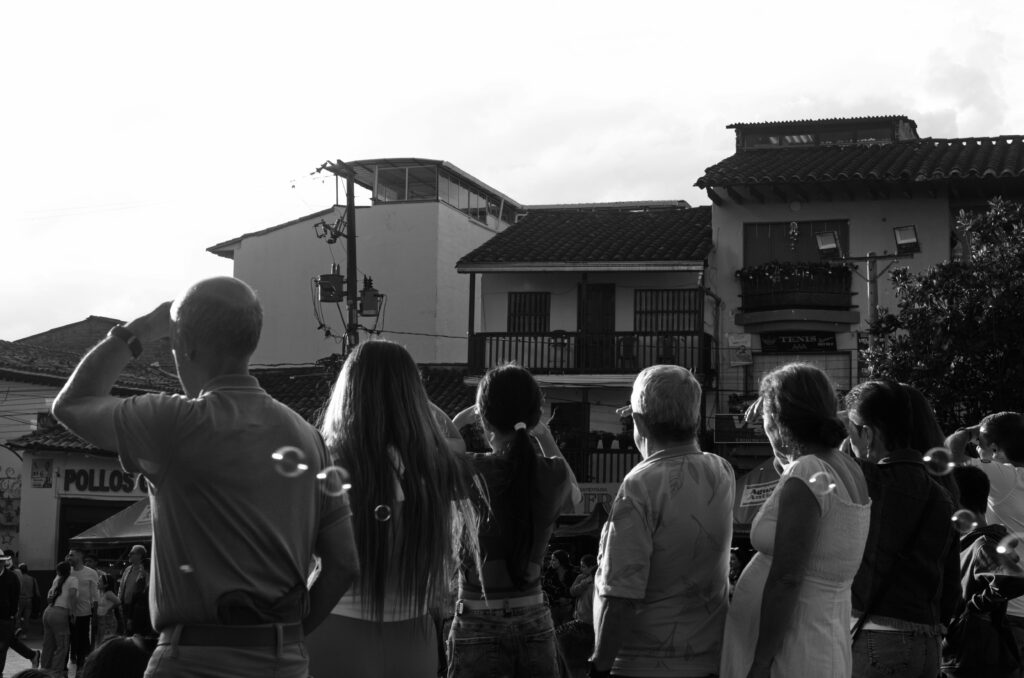Motherhood as a gift and responsibility
Bioethical reflections on “To Each His Own”

The same year that Frank Capra’s immortal classic It’s a Wonderful Life was released, Mitchell Leisen’s To Each His Own was released. And both films could compete when it came to an unforgettable ending. Capra’s film, according to the expression of Canadian scholar Georges Toles, culminated in a way that expressed the most overflowing joy.
“I think this is our dance, mother”
I cannot help but consider Capra’s entire career as an arduous apprenticeship in pursuit of the supreme achievement of the conclusion of this film, an apprenticeship in which all the other “happy endings” […] that he conceived can be perfectly understood as preliminary sketches of this. In It’s a Wonderful Life!, joy liberated from the depths of pain reaches nothing less than titanic strength. […] It is a joy capable of repairing for a short period any gap that tragedy has opened.[1]
For his part, Mitchell Leisen drew attention to the fact that also in the case of To Each His Own, much of its impact was saved for the last seconds before The End.
For me, the best thing about this movie is the final line, when he realizes that she [Jody Norris (Olivia de Havilland)] is not just a nice lady like he’s always thought she was. He says, “I think this is our dance, mother.” You can’t improve something like this. It is absolutely perfect. It couldn’t have been done any other way; I knew it and I finally got Charlie [Charles Brackett, the screenwriter], to see it too. You see him dancing with her for about fifteen seconds and then it cuts away. The theater owners wrote to me: “Please add something else at the end to let people dry their tears. We turn on the lights and the audience is crying so much that they can’t see the exit of the cinema.”[2]
The recognition that you are the mother
If we are allowed to continue with this parallel with It’s a Wonderful Life, both films tell us that people are irreplaceable in the network of relationships we establish with others. And realizing this reality and verifying first-hand that this happens is of the greatest significance. A mother’s place is unique and unrepeatable. The film that concerns us now focuses on the story of a mother who has not been able to tell her son from within her heart who she is in relation to him for around twenty-five years. She has maintained a selfless and selfless silence, moved only by the thought and conviction that she was the best for him. She was tempted to open his eyes about it when the little one was about five or six years old. The pain that she was going to inflict on him by digging into the wound of his status as her adopted son—something that her schoolmates had said was offensive—stopped him completely.
He then sadly acknowledged hers: “I’m not his mother. Not the real one. Now I know. She is not a mother just by bringing a child into the world. You need to have been there, to take care of him when she has whooping cough and measles, to know what to tell him when he is sick. “It’s all I’ve been missing.”
A story of the value of motherhood that transforms two loners
We need a brief summary of the film’s plot to understand these phrases in their true dimension. Leisen featured the original story and screenplay by Charles Brackett (1892-1969)—the renowned filmmaker who formed a memorable screenwriting team with Billy Wilder (1906-2002) on thirteen occasions—with the collaboration of Jacques Théry (1881- 1970). It will not be entirely risky to present the subject of To Each One His Own as a story of the value of motherhood that transforms two loners.
A woman, Jodi Norris, is in London during World War II, volunteering against German air raids by monitoring from the roofs of large buildings. She saves the life of a dour companion, Lord Desham (Roland Culver), who spoke harshly to her while they searched the building’s roof. She resolutely manages to rescue him with a rope while he was holding on after a fatal slip. The extreme situation[3] leads both characters to find themselves called upon to review their lives, emerging from the isolation and the option of oblivion in which both find themselves mired.
Jodi also receives news that a soldier, Lieutenant Piersen (John Lund), a United States Army pilot, is going to the London train station that same night. As the railway is delayed, Leisen sets up a long flashback while she waits at the station, in which we are informed of his biography and his current situation. The soldier is the son she had after a one-night meeting with her father. Captain Bart Cosgrove (John Lund) was forced to immediately return to combat in France and died before they could marry. To avoid gossip, Jodi did not acknowledge that she had had a son, who was eventually given up for adoption to a friend of hers, Corine Piersen (Mary Anderson), who had just lost her newborn. The boy grew up with Corine and Jody was never able to present herself to him as who she was. Now, during the visit to London, Lord Desham’s providential action will finally allow the happy meeting and recognition to take place, when the young man is already about twenty-five years old. The British nobleman emerges from the isolation and bitterness that engulfed him twenty years earlier, the loss of his wife and his son. By providentially helping Jodie, he causes her heart to be reborn.
The “feminine genius” is linked to a woman being suitable for motherhood
Furthermore, the entire film insistently tells of the greatness of motherhood, or better, of the fact that there are women who have freely accepted the bonds that are created with their children, either through natural generation or through of adoption. Cinema, with its ability to present issues on the screen in a concrete way, persuasively shows that being a mother is not something abstract, but a key element of the biography of many women. It is the concretion of the feminine genius, in the expression of John Paul II, explained by Margaret Harper McCarthy.
When speaking of “female genius,” John Paul II was referring to a specific talent or intelligence of women, something that she has due to her specific difference from men. […] In the same way that her specific (female) body is the form in which the human body that she has in common with man is given in her, so her specific genius is also the way in which all the others are given in her. [aspects of his genius]. She delves into the most intimate part of humanity (as in all the cells of her body) without compromising the identity of nature that she shares with man. Specifically, this “genius” is linked to the fact that a woman is suitable for motherhood, capable of welcoming and giving the necessary space to a child as a consequence of her welcoming the man. A woman allows the child to grow up respecting her otherness (Evangelium vitae, 99); it makes the person “safe in his nature and in his being” […] The germ of the feminine “genius” is her “special openness to the person” (Mulieris Dignitatem, 18), because she has been “entrusted with the human being.” in a special way” (Mulieris Dignitatem, 30). In it the human being finds his first home [4].
“That I had found you. That he would always love you, even if he didn’t see you anymore”
Before falling in love with Captain Bart Cosgrove (also played by John Lund, to make the resemblance between father and son more evident), Jody had received the following criticism from a suitor Mac Tilton (Bill Goodwin): “You have an idea. childish of what love is. You wait too much. You think the world will suddenly be rosy.” To which the young woman answers with determination: “Well, if this doesn’t happen, I’m not interested.”
This elevated idea of love, far from being an inconvenience, will allow her to recognize in the soldier—whom she meets for only a few hours—her true love. Although he, at first, took her on a flight with the plane to have a flirt, her reaction brings him back to what is essential, when she hears him say: “I knew when I saw you eating the sandwich with a face.” dream… What had happened? That I had found you. “That I would always love you, even if I didn’t see you again.” A few seconds later, the film shows how Jody reads a letter from the pilot from the combat zone in France that confirms the correspondence of feelings and determination of will: “This morning, in the middle of aerial combat, I imagined you looking at me. And for a second there was nothing else in the world but your eyes and a voice that screamed: ‘I have to hold on and go back to my darling. I have to return'”.
“The guide of a mother of a large family: ‘being surrounded by children is the sweetest thing in the world’”
Leisen and Brackett make it clear that the marriage between Jodi and Captain Cosgrove was not a mistake, but rather a precarious way of getting married under the circumstances tragically imposed by the war. We can speak of a sense of obedience to true love that leads to authentic marriage without reservations.
And that same generosity before the call of love will be what will cause Jodi to also have an almost innate perception of the value of her motherhood. And she will undoubtedly influence a truly extraordinary character. One of the happiest contributions of the duo of Mitchell Leisen and Charles Brackett is the role of Belle Ingram. The director himself stated: “using Alma Macrorie [who was the film’s editor] as Belle Ingham was an inspiration. She was natural and perfect.” [5] We see a mother of a large family who acts as a teacher in that feminine genius, to which John Paul II referred. When she congratulates Corinne Piersen on her announcement that she is pregnant, she does so from a genuine song of love for her children: “Mrs. Piersen, let me tell you something: ‘being surrounded by children is the sweetest thing in the world.’”
At that same moment, Corine drinks a glass of cold milk, highly recommended for her condition. When she and Alma leave Jody’s father’s pharmacy where they were meeting, she drinks the same soda, even though she had stated that she didn’t like it one bit. Thus, Leisen announces that she is pregnant.
Threats against motherhood
Being pregnant without having married, made Jodie’s situation very fragile, and she will have to face three threats. The first and earliest is that of a wrong medical diagnosis that invited an operation that led to the death of the baby. She was told that she was suffering from an illness that placed her “in constant danger of peritonitis” with the risk of death. At first, Jodie seems inclined, although she asks for time to consult him. But when she finds out that her husband has died in a war, she announces to her father: “I’m going to have a boy. It’s by Bart Cosgrove. He was shot down in France. They talk about him as if he were dead. Like that, without further ado. But he is not dead. Not while this child lives. And so it will be. I don’t care what the doctors say. “This child will be born.” In the next scene, after the birth of the completely healthy child, the doctor comments to Jodie: “I have reviewed his x-rays. […] You are fully recovered. A mockery of science.”
A few weeks ago, the journalist Carola Minguet alluded to a real case, the testimony of a young married couple who were friends, who were waiting for a girl who they knew was going to have many difficulties in living.
Her parents knew that she was seriously ill from the beginning of her pregnancy, which they could have stopped, as recommended by medical protocols in these cases. However, they have not avoided the affliction of waiting for her death, which has finally visited the little girl in her mother’s womb.[…] So much for the purpose of saying something, albeit clumsily, about the anthropological certainty behind this history. But it would be unfair to end up alluding only to what is intelligible, when the brief but precious life of little Mary has far crossed this limit. She used to say that ineffable is what cannot be expressed in words, but it is not always necessary to elucidate what happens. If a blind man who regains his sight is asked what happened, he can only announce that he did not see before and now he sees. I don’t know how to explain how this girl has illuminated a hidden reality, but that she exists, in this life and in the next. But it has been like that. And she has done it with a light that does not go out [6].
The light that does not go out in the face of intransigence or motherhood subjected to money
The most dramatically repeated diagnostic error against life, as Dr. Minguet points out, is not seeing in every girl or boy who comes into this world that novelty, that unique and unrepeatable light that does not go out. Very present in the eyes of the heart of parents. Very opaque to a merely instrumental logic, insensitive to the traces of true humanity.
The other two threats against motherhood are different. The first in decline: the mentality that placed children born out of wedlock in a shameful place. Jody’s father will tell him bitterly: The boy is also my grandson, and he will not suffer because of you. He won’t grow up with a label. If they suspect that he is yours, his life will not be worth living. Today, for example, the Charter of Family Rights of the Holy See of October 22 denounces this way of protecting the family when it establishes in article 4: e) All children, born inside or outside the marriage, enjoy the same right to social protection for their integral personal development.
On the other hand, the second is on the rise with the insidiously widespread practice of surrogacy. Motherhood subject to money. In one of the toughest moments of the film, Jodie seeks to recover her son with financial blackmail. If Corine agrees to let her little one go with her, he will support the loan that the Piersen family business needs. Although the adoptive mother relents out of concern for the subsistence of her other two children, little Grigsy (Billy), as we have seen, refuses to live anywhere other than her adoptive mother.
Conclusion
What Jodie Norris learns throughout the film is that motherhood is a gift, from which we must read the responsibility that derives from it. Well-lived motherhood respects that children grow in the dignity they have from the first moment of conception. Dealing with it as if it were a matter of production of goods is the most perverse of the deformations of its meaning. Jodie falls into that temptation… and pays the consequences for it.
Mitchell Leisen’s wisdom in reading the meaning of motherhood in To Each His Own can act as a balm that remedies our epochal blindness. And I hope that it will have as a direct consequence that we are grateful to be able to look at the mothers who have freely decided to be mothers of families with many sons and daughters to see them as the true teachers in living motherhood as a gift, as an unfailing exercise of daily love: ‘being surrounded by children is the sweetest thing in the world’. We can’t help but repeat it.
José-Alfredo Peris-Cancio – Professor and researcher in Philosophy and Cinema – Catholic University of Valencia San Vicente Mártir
***
[1] Toles, G. (2022). A house made of light. (R. Becerra, & J. Fontán, Trans.) Córdoba: UCOPress, pp. 84-85.
[2] Chierichetti, D. (1997). Mitchell Leisen. Hollywood director. San Sebastián-Madrid: San Sebastián International Film Festival-Filmoteca Española, p. 202.
[3] Jaspers, K. (1993). Significant figures. (J. Franco-Barrio, Trans.) Madrid: Alianza Editorial.
[4] Harper McCarthy, M. (2022). Maternity. In J. Noriega, R. Ecochard, & I. Ecochard, Dictionary of sex, love and fertility (S. Corcuera, Á. Pérez, & M. Martínez, Trads., pp. 597-603). Madrid: Didaskalos., p. 600.
[5] Chierichetti, D. (1997). Mitchell Leisen. Hollywood director, cit., p. 199.
[6] Minguet Civera, Carola, “A light that does not go out (A D.F.)”, https://religion.elconfidencialdigital.com/opinion/carola-minguet-civera/luz-que-apaga/20240312030110048782.html
 (EN)
(EN)
 (ES)
(ES)
 (IT)
(IT)





